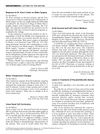 47 citations,
November 2021 in “Advanced Functional Materials”
47 citations,
November 2021 in “Advanced Functional Materials” The new hydrogel dressing with natural molecules helps heal wounds faster and improves skin repair.
 47 citations,
February 2014 in “Aaps Pharmscitech”
47 citations,
February 2014 in “Aaps Pharmscitech” Improved hair loss treatment using special particles and surfactants.
 1 citations,
January 2013 in “Archives of Aesthetic Plastic Surgery”
1 citations,
January 2013 in “Archives of Aesthetic Plastic Surgery” Combining liposuction with laser ablation effectively reduces underarm odor with minimal side effects.
 39 citations,
June 2017 in “Journal of Applied Research on Medicinal and Aromatic Plants”
39 citations,
June 2017 in “Journal of Applied Research on Medicinal and Aromatic Plants” Plant-based ingredients are effective and safe for modern skincare products.
 33 citations,
September 2019 in “Dermatologic Surgery”
33 citations,
September 2019 in “Dermatologic Surgery” Using a special stem cell formula on the scalp once a month for six months helped people with hair loss grow more hair.
 26 citations,
June 2011 in “International Journal of Pharmaceutics”
26 citations,
June 2011 in “International Journal of Pharmaceutics” SLN suspensions work as well as commercial solutions for minoxidil delivery, but are non-corrosive, making them a promising alternative.
 23 citations,
February 2004 in “Clinical and Experimental Ophthalmology”
23 citations,
February 2004 in “Clinical and Experimental Ophthalmology” A boy with chromosome 13q deletion syndrome developed eye cancer, a woman with breast cancer lost vision due to a rare side-effect of her treatment, a man's vision worsened after using a hair loss drug, and two rare disorders were discussed. Optical Coherence Tomography is useful for diagnosing and monitoring these conditions.
14 citations,
March 2019 in “European journal of pharmaceutics and biopharmaceutics” Proretinal nanoparticles improve skin absorption and reduce irritation of topical retinoids.
9 citations,
January 2015 in “Springer eBooks” Using hair follicles can improve skin drug delivery.
8 citations,
January 2016 in “Cells tissues organs” Norepinephrine helps skin cells grow, which is important for hair growth.
 5 citations,
February 2004 in “Clinical and Experimental Ophthalmology”
5 citations,
February 2004 in “Clinical and Experimental Ophthalmology” Multiple eye conditions were studied, highlighting the importance of various imaging methods for diagnosis, the vision side effects of drugs tamoxifen and Propecia, and the usefulness of optical coherence tomography for diagnosing and monitoring macular and retinal diseases.
 4 citations,
August 2007 in “Journal of The American Academy of Dermatology”
4 citations,
August 2007 in “Journal of The American Academy of Dermatology” The document discusses a condition causing hair loss after surgery and a type of rosacea affecting the nose, with treatments including surgery and laser therapy.
 March 2024 in “Bioimpacts”
March 2024 in “Bioimpacts” 400 nm particles penetrate hair follicles best, but mouse models aren't fully reliable for human studies.
 January 2024 in “Advanced Science”
January 2024 in “Advanced Science” New microspheres help heal skin wounds and regrow hair without scarring.
1 citations,
May 2024 in “Pharmaceutics” Hemp is a promising ingredient for skin products due to its healing and soothing properties.
 15 citations,
January 2021 in “Journal of Materials Chemistry B”
15 citations,
January 2021 in “Journal of Materials Chemistry B” Silk nanofiber hydrogels help stem cells heal wounds faster and improve skin regeneration.
5 citations,
April 2022 in “IntechOpen eBooks” Nanoemulgel is a better way to deliver drugs through the skin for various conditions.
 January 2020 in “Open Journal of Obstetrics and Gynecology”
January 2020 in “Open Journal of Obstetrics and Gynecology” All women with Polycystic Ovary Syndrome (PCOS) in a study had at least one skin disorder, with the most common being excessive hair growth, acne, dark skin patches, hair loss, and oily skin.
 January 2023 in “Theranostics”
January 2023 in “Theranostics” A patch with curcumin-zinc can improve hair growth and health by delivering beneficial particles to the skin, increasing hair follicles, and reversing effects of a hair loss hormone.
 47 citations,
March 2016 in “Journal of dermatology”
47 citations,
March 2016 in “Journal of dermatology” Understanding the genetics of rare inherited ichthyosis syndromes is key for better treatments and genetic counseling.
 10 citations,
May 2018 in “Forensic Science International”
10 citations,
May 2018 in “Forensic Science International” Shrunken heads retain some facial features and hair characteristics, allowing for limited individual identification.
 1 citations,
June 2023 in “Ethnobotany research and applications”
1 citations,
June 2023 in “Ethnobotany research and applications” The review concludes that the Ziziphus species, especially jujube, may promote hair growth and have various health benefits, warranting more research.
 3 citations,
May 1999 in “Dermatologic Surgery”
3 citations,
May 1999 in “Dermatologic Surgery” Dr. Connelly agrees that linear basal cell carcinomas might be more aggressive but highlights the study's lack of clear criteria to identify them.
1 citations,
April 2022 in “Applied sciences” Bitter melon extract may help prevent hair loss and can be used in cosmetic products.
March 2024 in “International journal of molecular sciences” The research identified key proteins that affect wool fiber thickness in Angora rabbits.
 November 2023 in “Scientific Reports”
November 2023 in “Scientific Reports” A gene mutation in Lama3 is linked to a common type of hair loss.
 33 citations,
July 2021 in “Clinical, Cosmetic and Investigational Dermatology”
33 citations,
July 2021 in “Clinical, Cosmetic and Investigational Dermatology” Nanocarrier technology in cosmetics improves ingredient delivery and effectiveness while reducing side effects.
 1 citations,
December 2023 in “Biomaterials advances”
1 citations,
December 2023 in “Biomaterials advances” Sponges made of soy protein and β-chitin with human cells from hair or fat can speed up healing of chronic wounds.
17 citations,
January 2004 in “European journal of obstetrics, gynecology, and reproductive biology/European journal of obstetrics & gynecology and reproductive biology” Certain hormone medications can treat symptoms like acne and unwanted hair, regulate periods, and prevent pregnancy in women and teenage girls.
April 2024 in “Molecules/Molecules online/Molecules annual” Paris polyphylla saponins may effectively treat acne due to their antibacterial and anti-inflammatory properties.





















